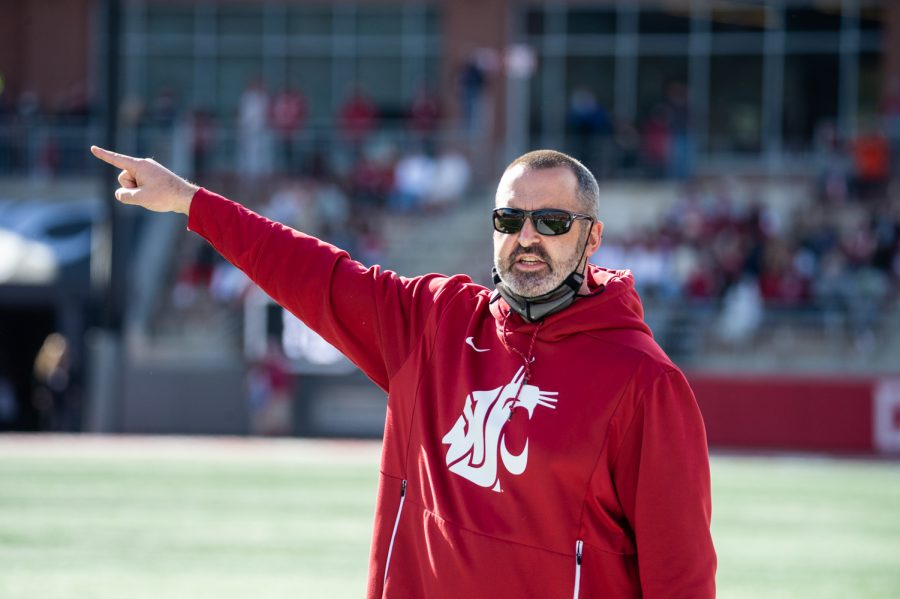Washington State University made national headlines on Oct. 18 when head football coach, Nick Rolovich, was fired after his request for a religious exemption from the COVID-19 vaccine was rejected. Rolovich and his legal team filed a lawsuit alleging “discriminatory and vindictive” behavior against WSU Pullman’s athletic director, Pat Chun. The VanCougar investigated what legal processes took place behind the university’s firm decision.
Rolovich’s attorney, Brian Fahling, did not respond to The VanCougar’s request for an interview, but said in a statement to ESPN, “It is a tragic and damning commentary on our culture, and more specifically on Chun, that Coach Rolovich has been derided, demonized and ultimately fired from his job, merely for being devout in his Catholic faith.”
“We really wanted to make sure [the exemption process] was fair and equitable. And so we took great pains. I would say before we even started soliciting exemption requests, we put a lot of time into making sure we got it right.” – Phil Weiler
Faculty from WSU Pullman reflect on the choices the university has made regarding mandates, religious exemptions and the legal ramifications since the start of fall semester. Phil Weiler, vice president of marketing and communications at WSU Pullman, spoke about the hardships WSU has faced over the past six months regarding decisions surrounding student and employee vaccination requirements.
“We decided to wait and see what the governor’s mandate would be so that we didn’t come up with a system that was out of step with all the other higher institutions of the state,” Weiler stated. “At that point, some of the legal barriers had already been dealt with, so the governor’s office allowed for either a medical exemption or a religious exemption [from the COVID-19 vaccine] for a seriously held religious concern.”
Much of the criteria for exemption was up to the discretion of the university, alongside orders from Governor Jay Inslee, who announced the Oct. 18 deadline for state employee vaccination exemptions. Weiler explained it was important for the university to create review criteria to ensure everyone was getting a fair shot at being excused from the mandate if necessary.
“The best way that I can describe it is that we really wanted to make sure [the exemption process] was fair and equitable. And so we took great pains. I would say before we even started soliciting exemption requests, we put a lot of time into making sure we got it right,” Weiler said. “The last thing we wanted was that some either got an exemption or didn’t get an exemption and then claim, ‘that person got special treatment and I got singled out for unfair treatment.’”
Religious exemptions are reviewed by a committee in a two-step process, while medical exemptions are dealt with similarly. Weiler said individuals on the committee consisted of staff with professional backgrounds in their respective legal fields, and were provided with training in the university’s exemption criteria.
The first step of the religious exemption process is a blind review by the committee, ensuring fairness and anonymity among all requests. Once the committee decides whether the request meets legal standards for an exemption, the second step is to send the determination off to human resources, which include the individual’s supervisor and environmental safety staff. Following this, the group then decides if the individual can successfully do their job without meeting the university’s vaccination requirements.

From a legal perspective, this matter of fairness and equitability is something Cornell Clayton, WSU Pullman professor of political science, described as a matter of due process.
“As a general matter, WSU, as a state university, is required to adhere to the principles of due process and avoid making arbitrary or capricious decisions. So, the question in terms of firing a particular employee for violating a university policy goes to whether or not the university adhered to due process or a fair procedure,” Clayton said.
Despite Rolovich’s four assistant coaches—Ricky Logo, John Richardson, Craig Stutzmann and Mark Weber—also being fired for the same reasons, Weiler said the general attitude surrounding vaccinations around WSU is not as drastic as it appears in external media coverage. In fact, according to WSU Insider, WSU has a vaccination rate of over 90% across all campuses, with less than 1% of employees separated from the university because of refusal to declare their vaccination status.
“There has been so much attention paid to [Rolovich] but you know, the number of people who chose to separate from the university is such an infinitesimally small number,” Weiler said. “There is a risk [when] you spend so much time focused on one individual, and we sort of assume there must be a lot of other people in the same situation, and the fact of the matter is there really isn’t.”
Regarding the media frenzy of Rolovich’s lawsuits and ensuing policy debates, the discussion has transitioned from a thoughtful discussion surrounding vaccine mandates to a drawn-out legal battle. The general mindset around WSU focuses on getting back on track to pre-pandemic life, but the more time and resources allocated to resolving Rolovich’s consequence, the more time WSU’s recovery could take.

Andrew is a junior studying English and Digital Technology and Culture at WSU Vancouver.
